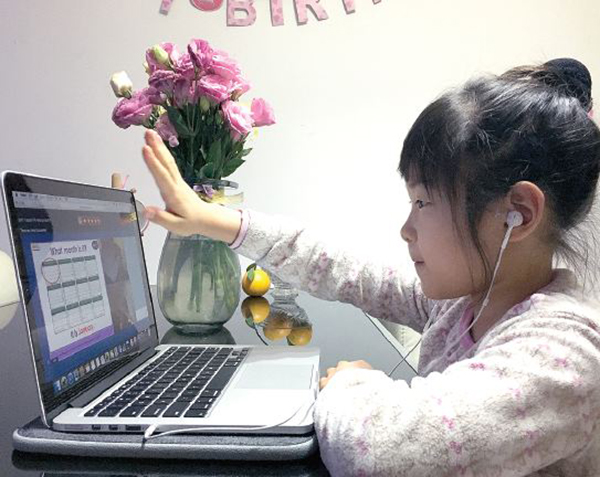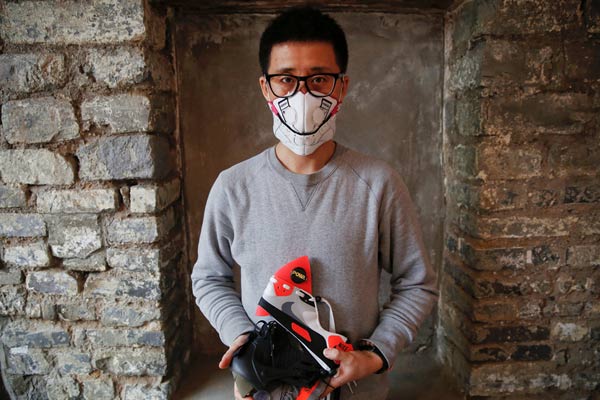If US won't pay its teachers, China's tiger moms will
 |
|
Yang Zixuan, 8, a student at Beijing No 2 Experimental Primary School learns English through VIPkid online courses. [Photo provided to China Daily] |
Company matches underpaid teachers in US with Chinese parents willing to pay
Cindy Mi leans forward on a couch in her sun-filled Beijing office to explain how she first got interested in education. She loved English so much as a child that she spent her lunch money on books and magazines to practice.
By 15, she was good enough that she began to tutor other students. At 17, she dropped out of high school to start a language-instruction company with her uncle.
Today, Mi is 33 and founder of a startup that aims to give Chinese kids the kind of education American children receive in top US schools. Called VIPKid, the company matches Chinese students aged five to 12 with predominantly North American instructors to study English, math, science and other subjects.
 |
|
Cindy Mi, founder of education startup VIPKid. [Photo provided to China Daily] |
Classes take place online, typically for two or three 25-minute sessions each week. Mi is capitalizing on an alluring arbitrage opportunity. In China, there are hundreds of millions of kids whose parents are willing to pay up if they can get high-quality education. In the US and Canada, teachers are often underpaid-and many have quit the profession because they couldn't make a decent living.
Growth has been explosive. The three-year-old company started this year with 200 teachers and has grown to 5,000, now working with 50,000 children. Next year, Mi anticipates she'll expand to 25,000 teachers and 200,000 children.
Over the years, education experts and traditional teachers have criticized online learning, arguing that nothing can duplicate the face-to-face interaction of a physical classroom. In China, parents are so bent on getting their kids the best education possible they're sometimes willing to try untested methods that may or may not provide high-quality education.
Quality is key
Mi hired top people to help design VIPKid's curriculum and has recruited academic advisers from respected American universities, but she's mindful of the challenges. "What keeps me up at night is not growth, it's quality," she says, wearing a bright orange workout top with her company's logo and name in large block letters. "We need to be responsible for the learning outcome."
VIPKid has big names betting on its prospects. The company has raised $125 million from firms including Sinovation Ventures, Northern Light, Jack Ma's Yunfeng Capital and Sequoia Capital China. Basketball legend Kobe Bryant invested and advises Mi.
Sinovation, led by former Google China chief Kaifu Lee, funded VIPKid when it was just an idea in Mi's head and incubated her team at its Beijing headquarters for 15 months before product launch. "We really felt education could be reshaped with the power of the Internet," Lee said.
After years of hard work, she dreamed of making a bigger impact. She went back to school and studied at Cheung Kong Graduate School of Business and spent a semester at Cornell University in Ithaca, New York. In 2013, she pitched the idea for VIPKid to Lee, and his firm invested that December. Mi and her three co-founders moved into Sinovation's offices and spent 15 months working on the software and curriculum.
China Online Education Group, known as 51Talk, began connecting Filipino instructors with Chinese students for English classes online four years ago-and went public in June. It has 102,000 students across all ages taught by 8,000 teachers.
TutorGroup Co, which works in China under the VIPABC brand, boasts Singapore's Temasek Holdings Pte as well as Goldman Sachs Group Inc among its backers. The company, which hit a $1 billion valuation in late 2015, offers maths and language tutors with many North American instructors and says it has spent almost two decades in the market.
Mi's goal was to deliver not the cheapest way to study, but rather the most efficient way to learn for the time and money invested. She knew Chinese parents would pay if they saw their children actually learning, rather than wasting time with poor teachers or programs.
Hiring talent
Mi brought in Lane Litz, who had worked in three countries on how children learn second languages, to lead development of a standardized curriculum so the company would have control over what was taught.
The team worked on easy-to-use software that would allow students in China to learn from native English speakers a half world away with real-time audio and video links.
The software works a bit like corporate video-conferencing. A typical 25-minute lesson has about 30 slides and the curriculum builds from session to session so a child can develop their vocabulary and fluency.
Parents buy a package of lessons and their children can then select which teachers they want. A block of 72 classes is about $1,500, or about $21 each.
Douglas Gao, 10, began studying English as part of an early trial group in 2014 and has kept going.
His father, Victor, says the price is comparable to a group English class his son took, but those were inconvenient and ineffective. Now Douglas is speaking in complete sentences and his 6-year-old brother has started the program.
"Of course face-to-face is the most effective method for learning, but kids these days are very computer-friendly so it's very easy for them to pick it up," the father says.
VIPKid recruits teachers through referrals and social media and gets 10,000 to 20,000 applications a month. Prospective hires are tested and screened and about one out of every 10 applicants are approved, Mi says.
Successful ones take VIPKid's training courses for about a week and need to pass a final test before starting work. They're not required to have degrees in education, but do need a bachelor's degree and some teaching experience.
VIPKid says most of its instructors are experienced current or former teachers. April Baker, a 42-year-old single mother in Pennsylvania, started teaching with VIPKid in August, in part because of financial pressures from her divorce last year. She teaches most days between 7 am and 9 am and often again from 8 pm until midnight.
The $20 to $22 an hour she makes helps supplement her income as a fitness instructor for seniors, and the flexible hours allow her to look after her kids.
VIPKid offers regular incentives for teachers, including computer gear and T-shirts. Mi says she hasn't begun to think about an IPO because there is so much work to do in managing growth. She thinks it may be only three or four years before VIPKid has a million students, a dizzying prospect for a three-year-old enterprise.
She sees an opportunity to improve the effectiveness of education with such an enormous group of students and she's set up a research institute to work on developing best practices.
Robert Hutter, managing partner of the Silicon Valley venture firm Learn Capital, is chairman of the group, and its advisers include professors from Stanford, Harvard and the University of Southern California. "The sheer scale of this presents the opportunity to examine theories that you couldn't look at in your own lab," says Bruce McCandliss, a professor at Stanford's Graduate School of Education who will help develop the research agenda.
Bloomberg























